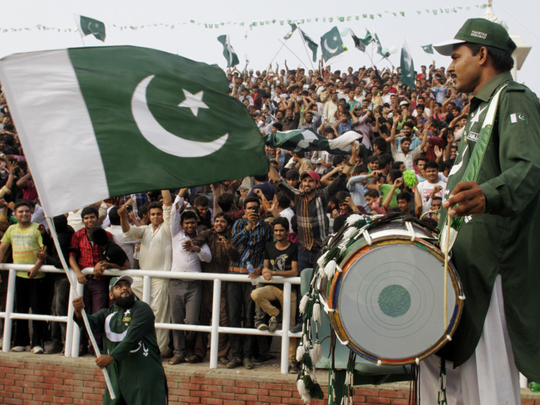
The legacy of Pakistan’s troublesome birth and its eventful journey through many trials and tribulations was hardly evident on Friday, August 14, as Pakistanis joined hands across the country to robustly celebrate their 68 years of independence.
At the time of its birth in 1947, Pakistan was roundly rejected by many sceptics as a state that would not survive for long, let alone prosper and grow into one central to many matters of global significance. Yet, Pakistan’s historical journey has proven sceptics wrong. In sharp contrast to the images of scores of refugees that crossed over into Pakistan from India, adding unprecedented stress to the newborn country, today’s Pakistan is here to stay.
Friday’s celebrations brought together numerous reminders of Pakistan’s success story, demonstrated amply in more ways than one. It was a day of powerful reminders of many elements of the success stories that have become the hallmark of Pakistan.
Though Pakistan is not short of potentially acute or outright acute challenges, the country’s ability to withstand the test of time has proven to be inspirational. The past year has seen Pakistan boldly stand up to Taliban militants, who were once seen successfully advancing in their push to gain space across the South Asian country.
On Friday, a number of soldiers and officers, including those who laid down their lives in bravely facing the Taliban, were honoured with the announcement of high profile military awards.
This came simultaneously with awards announced for excellence in fields ranging from the arts, education and culture to a variety of sciences.
Diverse areas of excellence
Beyond just the ceremonies, which will be held when the awards are formally given, their sheer variety amply pointed towards the diverse areas where Pakistanis have excelled. In part, the country’s survival has been ensured all along by its more than half a million strong armed forces who ultimately form the bed-rock of Pakistan’s national security framework.
This is important to not only protect Pakistan’s security interests against India — a neighbour with whom Pakistan has fought three wars. More immediately, Pakistan’s armed forces hold a pivotal position in the ongoing campaign against Taliban militants whose leaders have repeatedly expressed their determination to take charge of the country.
Just days before Independence Day on Friday, General Raheel Sharif, the respected army chief, finally recommended the death sentence for terrorists who were put on trial through recently formed military courts.
In sharp contrast to just a year ago when many sceptics believed that the Taliban would eventually gain an upper hand in Pakistan, things couldn’t be more different today. And going forward, the ability of the Taliban to pose an existential threat to Pakistan appears to be virtually over.
Aggressive anti-Taliban push
Ceremonies during a special event in Islamabad on Friday, attended by Prime Minister Nawaz Sharif and President Mamnoon Hussain, included one in memory of the massacre of more than 140 Pakistani schoolchildren in a Taliban attack in Peshawar in December 2014. Rather than unnerve the army and the Pakistani nation, the Peshawar attack only worked to galvanise the Pakistani nation in support of a more aggressive push against the Taliban.
Meanwhile on the streets of Pakistan’s main cities, Friday’s celebrations were an opportunity for Pakistanis across the board to set aside their differences in favour of remembering their country’s legacy. From upper class neighbourhoods to low-income habitations, there was no shortage of joyful fervour to mark the day.
In Islamabad, the Pakistani capital, scores of visitors thronged venues of interest, including a replica of the Chaghai hills of Pakistan’s south-western Balochistan province. It was here in 1998, just weeks after India’s second round of nuclear tests, that Pakistan went ahead with its six maiden nuclear tests.
The decision not only brought out Pakistan as the world’s newest nuclear weapons’ state but also firmly gave Pakistan the prized position of being the only country in Muslim world armed with nuclear weapons.
Meanwhile, in a related event in the south western city of Quetta, up to 400 tribal militants including those who had fought the security forces for years, publicly laid down their arms on Independence Day. For years, the province of Balochistan, of which Quetta is the capital, has been at the centre of an insurgency.
Incentives to abide by the law
Though the problem is far from over, a combination of a concerted military push, alongside incentives for those willing to abide by the law, appears to be bearing fruit. Going forward, the Pakistani state needs to continue on its course as it seeks to restore peace to Balochistan.
At the same time, two important developments on Pakistan’s borders are set to improve the country’s prospects.
On the one hand, China’s promise of investing up to $46 billion (Dh169 billion) in new energy projects in Pakistan and a road linking western China with a Chinese-funded deep sea port at Gwadar in southern Pakistan, marks the largest foreign investment ever committed in this manner.
On the other hand, the coming removal of global sanctions on Iran-Pakistan’s western neighbour, Iran, paves the way finally for Pakistan to begin importing badly needed gas for its energy starved economy.
If the two initiatives succeed, they will become a game changer for Pakistan at a time when the South Asian country is faced with unprecedented economic challenges of the kind that require major inputs of energy supplies.
Eventually, Pakistan’s bottom line is abundantly clear. Friday’s celebrations underlined the widely shared conventional wisdom that Pakistan is here to stay.
Farhan Bokhari is a Pakistan-based commentator who writes on political and economic matters.












